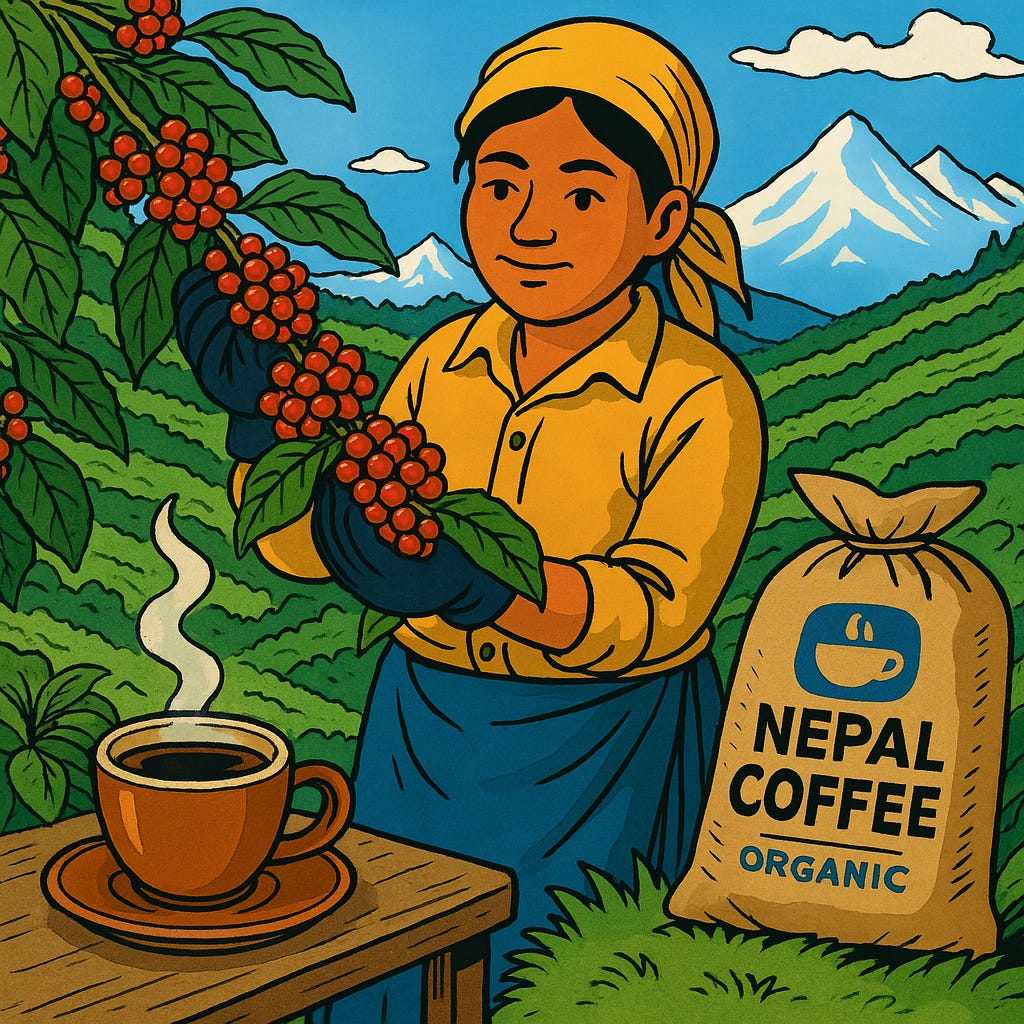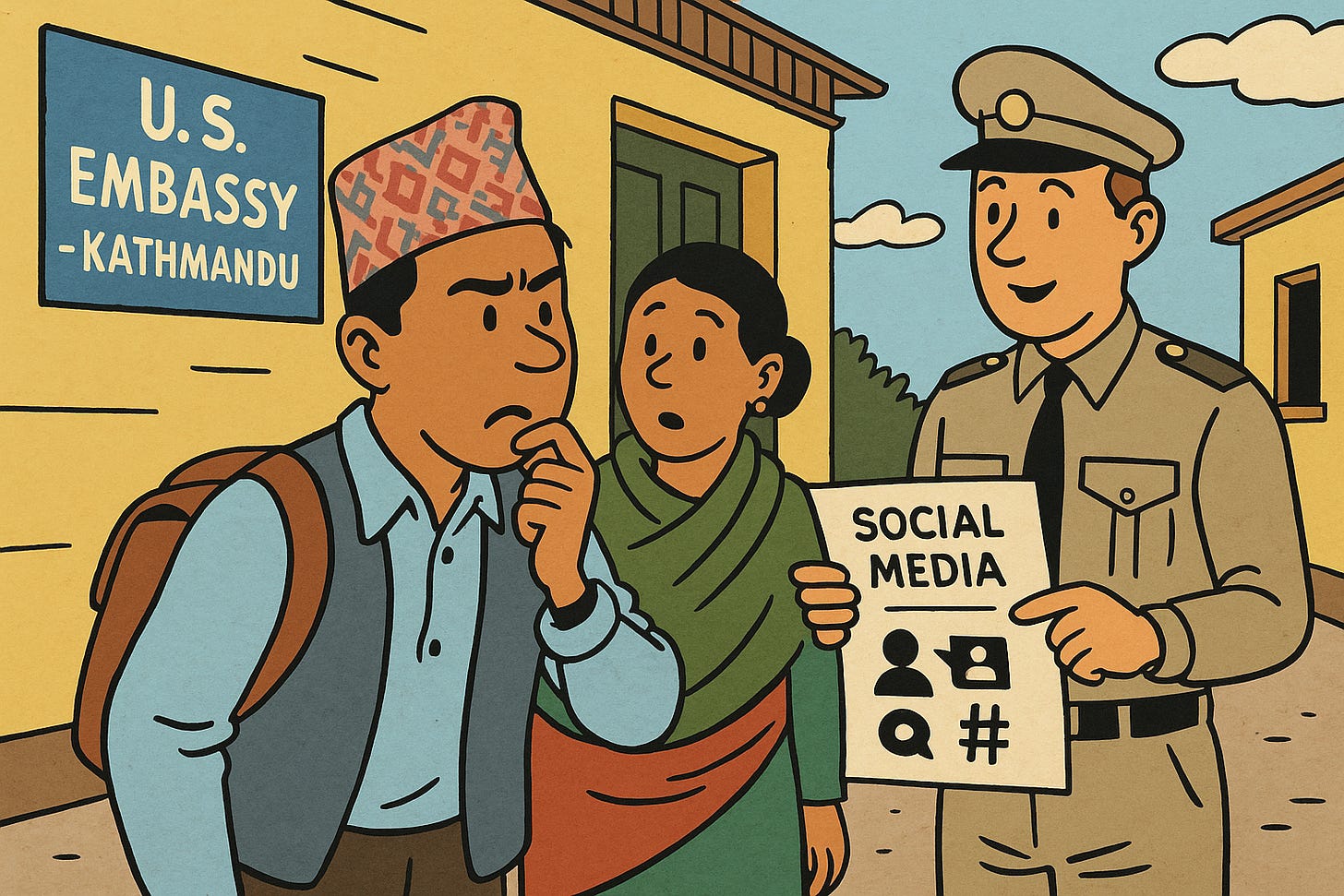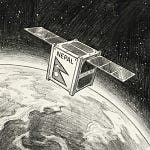Share the love! Help others that care about Nepal stay up to date the easy way. If you like this issue, share it with a friend who follows Nepal and hit Subscribe for your weekly dose of curated, can’t-miss updates.
From overpasses to overhauls, it’s been a week of construction — and controversy — in Nepal. As leaders cut ribbons on flyovers and debate land scams, farmers wait for water, lawmakers trade blame over visas, and the US wants your Instagram public. Let’s dive into the headlines shaping Nepal at home and abroad.
Social & Cultural ⭐
Nepal’s agricultural potential continues to surprise, with both heritage crops and new ventures drawing global attention. In the cool, high-altitude hillsides of regions like Gulmi, Ilam, and Lalitpur, farmers are cultivating specialty coffee praised for its bright acidity, flavour complexity, and ethical, organic production. As detailed by Perfect Daily Grind, Nepali coffee remains rare—just 500 to 600 tonnes produced annually—but its exclusivity and traceability are winning over international roasters looking for unique origins that also align with sustainability standards. Meanwhile, Ilam’s tea gardens, long a symbol of Nepal’s tea culture, are getting overdue attention. Local authorities are working to revitalise historic plantations, offer interactive tea-picking experiences, and attract foreign buyers, though concerns persist over neglected heritage sites and lack of grassroots investment, reports TRN.
In Myagdi, a more unconventional success story is buzzing—literally. Locals have turned to commercial hornet farming, harvesting larvae prized for their nutritional value and serving them in local hotels as a high-protein delicacy, according to TRN. The practice has not only provided income but also contributed to hornet conservation, offering a quirky example of how rural entrepreneurship is evolving.
The digital landscape is also adapting to better support Nepalis abroad. Two new apps launched this week aim to improve services and safety for migrant workers. The ‘We’ Mobile App, developed with support from the Korean government, offers resources for employment, financial planning, and mental health in both Nepali and English, providing much-needed support for Nepalis navigating foreign labour markets, notes TRN. Meanwhile, the ‘Shram Sansar’ App promises to enhance how the government tracks and assists Nepalis overseas. The platform collects real-time data on locations and needs, enabling embassies to provide better consular support, assist undocumented workers, and respond to emergencies — a step officials hope will bring greater accountability to Nepal’s foreign employment sector, reports TRN.
At the same time, human rights organisations are sounding the alarm over Nepal’s persistent failure to enforce anti-torture laws. Despite clear legal provisions criminalising torture since 2017, there has yet to be a single conviction under Nepal’s Penal Code, raising serious concerns about a culture of impunity. According to KTM Post, incidents of custodial torture remain widespread, with the National Human Rights Commission recommending prosecution in 16 cases last year — none of which have been implemented. Recent deaths in custody, including that of Harisingh Pali in Kailali, have reignited calls for independent investigations and stronger legal reforms. Rights groups are urging the government to amend current legislation, remove reporting time limits for torture complaints, and establish independent oversight mechanisms to ensure perpetrators are held accountable.
Economy & Development 💸
Nepal’s overburdened roads got a modest but symbolic upgrade this week with the inauguration of the Gwarko overpass in Lalitpur, the first infrastructure of its kind in the country. Officials hope the new flyover will ease long-standing traffic congestion at one of Kathmandu Valley’s busiest intersections. Prime Minister KP Sharma Oli, who formally opened the overpass, described it as part of the government’s commitment to “holistic and multi-dimensional development,” though such promises have often been met with public scepticism given Nepal’s track record on project delays, as highlighted by THT and Onlinekhabar. That frustration is especially visible in projects like the Sunkoshi-Marin Diversion, intended to transform agriculture and energy supply for Madhesh Province. Despite being labelled a “national pride project,” dam construction is crawling, with just 7 percent of work completed even though half the contract period has already passed, reports KTM Post. Government officials and farmers alike are now calling for urgent action to avoid further setbacks on a project that promises year-round irrigation for over 122,000 hectares of farmland.
Trade reform is also on the agenda, with a new Customs Act proposed to simplify border procedures and support Nepal’s economic growth. Deputy Prime Minister and Finance Minister Bishnu Paudel says the law will make customs more efficient, promote exports, attract foreign investment, and curb illegal trade, while also granting updated powers and responsibilities to customs officers, according to THT. The bill has received feedback from lawmakers but faces a tight timeline for further revisions, reflecting Nepal’s perennial challenge of turning ambitious legislative frameworks into practical, well-executed reforms.
In a long-overdue move to address Kathmandu’s worsening air pollution, the government has also adopted Euro VI vehicle emission standards, effective immediately for all imported four-wheeled vehicles, notes THT. The new rules align Nepal with international standards on carbon monoxide, nitrogen oxides, and particulate emissions—potentially a step forward for public health. Air quality experts have cautiously welcomed the policy but stress that effective enforcement, infrastructure upgrades, and public awareness will be essential to ensure the standards deliver real environmental benefits.
Politics & Governance 🪧
Nepal’s long-running corruption scandals have reached the top echelons of politics once again, as former Prime Minister Madhav Kumar Nepal was granted bail this week in connection with the Patanjali land scam. The Special Court ordered his release on a Rs 3.5 million bail following a hearing that lasted several hours, with prosecutors seeking a 14-year jail sentence and recovery of Rs 185.85 million in alleged state losses. At the heart of the case is the accusation that Nepal, during his premiership in 2009, facilitated the sale of government-exempt land to Patanjali Yogpeeth, bypassing land ceiling rules. Nepal denies wrongdoing, claiming the Cabinet’s decision was policy-driven and legal. But as KTM Post and THT report, the case has renewed questions about impunity and blurred lines between governance and personal favour. The high-profile nature of the trial, involving 93 accused, could become a defining test for Nepal's anti-corruption institutions in the months ahead.
Meanwhile, the fallout over the visit visa scandal shows no signs of cooling, with fierce political divisions over the government’s newly formed investigation committee. The seven-member panel, headed by former Chief Secretary Shanker Das Bairagi, has been criticised by opposition parties like the Rastriya Swatantra Party (RSP) and Rastriya Prajatantra Party (RPP) as lacking independence and credibility. They argue that only a parliamentary or judicial inquiry, similar to the one that investigated RSP leader Rabi Lamichhane, can provide genuine accountability. The government, however, maintains that the bureaucratic committee will propose much-needed reforms to immigration and visa processes. As reported by Republica and THT, the controversy has reignited broader debates about institutional reform and the uneven application of anti-corruption measures.
Amidst the scandals, the governing coalition suffered another blow as the Janata Samajbadi Party (JSP Nepal) withdrew its support, pushing the government into a minority position in the National Assembly. Citing broken promises on constitutional amendments, good governance, and economic growth, JSP leaders announced they would now play the role of constructive opposition. While the government can technically survive without a National Assembly majority, as Republica notes, legislative business and the passage of bills are likely to face significant hurdles in the coming weeks.
Diaspora & Globalization 🌏
The latest visa policy update from the US Embassy in Nepal is raising eyebrows among prospective students and exchange visitors. Effective immediately, all applicants for F, M, and J non-immigrant visas—typically issued to students, vocational trainees, and exchange participants—are being asked to set their personal social media accounts to public to “facilitate vetting necessary to confirm identity and determine admissibility.” The embassy emphasises this as a national security measure, but the policy also invites reasonable questions about privacy and fairness. Social media often reflects personal expression, not official identity documents, and making accounts public could expose applicants to risks unrelated to visa eligibility. While governments have a legitimate interest in security screening, balancing that with individuals' digital privacy remains a challenge—especially for young Nepalis hoping to pursue education or cultural exchange abroad.
Meanwhile, the ongoing evacuation of Nepalis from Iran continues, with seven more individuals safely transported to New Delhi this week, according to KTM Post. The Indian government facilitated the rescue as part of broader efforts following regional tensions between Iran and Israel. Most of the evacuees are expected to return home via Butwal in the coming days.
Did you know ❓
Tucked away beyond Nepal’s crowded trekking routes lies the remote Nar Phu Valley, a hidden Himalayan gem offering dramatic landscapes and a glimpse into centuries-old Tibetan culture. Accessible only with a special permit, this isolated region in the Annapurna area remains largely untouched by mass tourism. Stone villages cling to cliffs, ancient monasteries like Tashi Lhakhang, blessed by Guru Rinpoche, dot the trail, and yak-herding locals still practise traditional ways of life. For trekkers seeking raw wilderness and authentic cultural encounters—without the congestion of Everest or Annapurna Base Camp—Nar Phu offers solitude, towering peaks, and a journey that feels like travelling back in time.Let’s connect
Enjoying this issue? 📩 Share it with a friend & let’s keep Nepalis worldwide in the loop! Got thoughts? Hit reply—we’re all ears! Or let us know what you think via our Feedback form or follow us on Facebook | LinkedIn
P.S. Got a story or issue you'd like us to cover next week? Drop us a reply — we're building this space together.
About Nepali Diaspora Digest:
The Nepali Diaspora Digest connects the global Nepali community with curated news, insights, and stories that matter most. Join us as we celebrate and explore the diverse voices and achievements of Nepalis worldwide.
Partner shout out
belayat.uk: helping Nepalis connect in the UK on jobs, housing, events and finding local Nepali owned businesses















